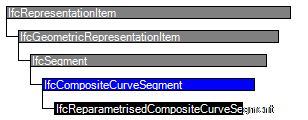Natural language names
 | Segment einer zusammengesetzten Kurve |
 | Composite Curve Segment |
 | Segment de courbe composite |
Change log
| Item | SPF | XML | Change | Description | IFC4 Addendum 1 4.0.1.0 |
|---|---|---|---|---|
| IfcCompositeCurveSegment | ||||
| SameSense | MODIFIED | Type changed from BOOLEAN to IfcBoolean. |
Semantic definitions at the entity
Entity definition
An IfcCompositeCurveSegment is a bounded curve constructed for the sole purpose to be a segment within an IfcCompositeCurve.
NOTE Definition according to ISO/CD 10303-42:1992
A composite curve segment is a bounded curve together with transition information which is used to construct a composite curve.
NOTE Entity adapted from composite_curve_segment defined in ISO 10303-42.
HISTORY New entity in IFC1.0
Attribute definitions
| # | Attribute | Type | Cardinality | Description | G |
|---|---|---|---|---|---|
| 2 | SameSense | IfcBoolean |
An indicator of whether or not the sense of the segment agrees with, or opposes, that of the parent curve. If SameSense is false, the point with highest parameter value is taken as the first point of the segment.
NOTE If the datatype of ParentCurve is IfcTrimmedCurve, the value of SameSense overrides the value of IfcTrimmedCurve.SenseAgreement | X | |
| 3 | ParentCurve | IfcCurve | The bounded curve which defines the geometry of the segment. | X |
Formal Propositions
| Rule | Description |
|---|---|
| ParentIsBoundedCurve | The parent curve shall be a bounded curve. |
Inherited definitions from supertypes
Entity inheritance

Attribute inheritance
| # | Attribute | Type | Cardinality | Description | G |
|---|---|---|---|---|---|
| IfcRepresentationItem | |||||
| LayerAssignment | IfcPresentationLayerAssignment @AssignedItems | S[0:1] | Assignment of the representation item to a single or multiple layer(s). The LayerAssignments can override a LayerAssignments of the IfcRepresentation it is used within the list of Items.
IFC2x3 CHANGE The inverse attribute LayerAssignments has been added. IFC4 CHANGE The inverse attribute LayerAssignment has been restricted to max 1. Upward compatibility for file based exchange is guaranteed. | X | |
| StyledByItem | IfcStyledItem @Item | S[0:1] | Reference to the IfcStyledItem that provides presentation information to the representation, e.g. a curve style, including colour and thickness to a geometric curve.
IFC2x3 CHANGE The inverse attribute StyledByItem has been added. | X | |
| IfcGeometricRepresentationItem | |||||
| IfcSegment | |||||
| 1 | Transition | IfcTransitionCode | Connectivity between the continuous segments is not enforced per se to be tangential. Setting "TangentialContinuity" to True means that the current segment shall continue with tangential continuity to the previous one. | X | |
| UsingCurves | IfcCompositeCurve @Segments | S[1:?] | The set of composite curves which use this composite curve segment as a segment. This set shall not be empty. | X | |
| Dim :=IfcSegmentDim(SELF) | IfcDimensionCount | The space dimensionality of this class, defined by the dimensionality of the first ParentCurve. | X | ||
| IfcCompositeCurveSegment | |||||
| 2 | SameSense | IfcBoolean |
An indicator of whether or not the sense of the segment agrees with, or opposes, that of the parent curve. If SameSense is false, the point with highest parameter value is taken as the first point of the segment.
NOTE If the datatype of ParentCurve is IfcTrimmedCurve, the value of SameSense overrides the value of IfcTrimmedCurve.SenseAgreement | X | |
| 3 | ParentCurve | IfcCurve | The bounded curve which defines the geometry of the segment. | X | |
Formal representations
XML Specification
<xs:element name="IfcCompositeCurveSegment" type="ifc:IfcCompositeCurveSegment" substitutionGroup="ifc:IfcSegment" nillable="true"/>
<xs:complexType name="IfcCompositeCurveSegment">
<xs:complexContent>
<xs:extension base="ifc:IfcSegment">
<xs:sequence>
<xs:element name="ParentCurve" type="ifc:IfcCurve" nillable="true"/>
</xs:sequence>
<xs:attribute name="SameSense" type="ifc:IfcBoolean" use="optional"/>
</xs:extension>
</xs:complexContent>
</xs:complexType>
EXPRESS Specification
ENTITY IfcCompositeCurveSegment
SUPERTYPE OF(IfcReparametrisedCompositeCurveSegment)
SUBTYPE OF (IfcSegment);
SameSense : IfcBoolean;
ParentCurve : IfcCurve;
WHERE
ParentIsBoundedCurve : ('IFCGEOMETRYRESOURCE.IfcBoundedCurve' IN TYPEOF(ParentCurve));
END_ENTITY;

 EXPRESS-G diagram
EXPRESS-G diagram Link to this page
Link to this page